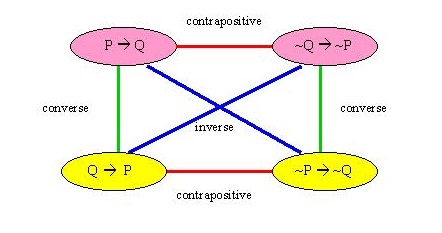8.3.1: Implication and contraposition

Therefore, when we know that a tomato $\omega $ is red, the probability, that the tomato $\omega $ is sweet, is equal to $1$. That is,
\begin{align} \mbox{" $[{}F (\{( y_{{}_{RD}} , n_{{}_{SW}}) \}) {}] (\omega) = 0$"} \quad \Longleftrightarrow \quad \Big[ \mbox{" Red"} \Longrightarrow \mbox{" Sweet"} \Big] \end{align}Motivated by the above argument, we have the following definition.
Of course, this (8.5) should be read as follows.
| $(A):$ | Assume that a measured value $(x_1, x_2) (\in X_1 \times X_2)$ is obtained by a measurement ${\mathsf M}_{L^\infty (\Omega)} ({\mathsf O}_{12} ,$ $ S_{ [\omega] })$. When we know that $x_1 \in \Xi_1$, then we can assure that $x_2 \in \Xi_2$. |
The above argument is generalized as follows. Let ${\mathsf O}_{12...n}$ ${{=}}$ $(\times_{k=1}^n X_k ,$ $ \boxtimes_{k=1}^n{\cal F}_k , $ ${F}_{12...n} = \underset{k=1,2,...,n}{\mathop{\overset{qp}{\times}}} F_k )$ be a quasi-product observable in $\overline{\mathcal A}$. Let $\Xi_1$ $ \in {\cal F}_i $ and $\Xi_2$ $ \in {\cal F}_j$. Then, the condition
\begin{align} {}_{{\mathcal A}^*} \big(\rho, {F}^{(ij)}_{12...n} (\Xi_i \times ( \Xi^c_j)) \big) {}_{\overline{\mathcal A} } = 0 \end{align} (where, $\Xi^c=X \setminus \Xi$) is denoted by \begin{align} [{\mathsf O}_{12...n}^{(i)};{\Xi_i}] \underset{ {\mathsf M}_{{\overline{\mathcal A}}} ({\mathsf O}_{12...n} , S_{ [\rho] }) }{ \Longrightarrow} [{\mathsf O}_{12...n}^{(j)};{\Xi_j}] \tag{8.6} \end{align}
Theorem 8.7 [Contraposition] Let ${\mathsf O}_{12}$ $=$ $(X_1 \times X_2 ,$ $ {\cal F}_1 \times {\cal F}_2 ,$ $ F_{12}{}{{=}} F_1 {\mathop{\overset{qp}{\times}}} F_2)$ be a quasi-product observable in ${\overline{\mathcal A}}$. Let $\rho \in {\frak S}^p({\mathcal A}^*) $. Let $\Xi_1$ $ \in {\cal F}_1 $ and $\Xi_2$ $ \in {\cal F}_2$. If it holds that
\begin{align} [{\mathsf O}_{12}^{(1)};{\Xi_1}] \underset{ {\mathsf M}_{{\overline{\mathcal A}}} ({\mathsf O}_{12} , S_{ [\rho] }) }{ \Longrightarrow} [{\mathsf O}_{12}^{(2)};{\Xi_2}] \tag{8.7} \end{align} then we see: \begin{align} [{\mathsf O}_{12}^{(1)};{\Xi_1^c}] \underset{ {\mathsf M}_{{\overline{\mathcal A}}} ({\mathsf O}_{12} , S_{ [\rho] }) }{ \Longleftarrow} [{\mathsf O}_{12}^{(2)};{\Xi_2^c}] \end{align}Proof. The proof is easy, but we add it. Assume the condition (8.7). That is, \begin{align} {}_{{\mathcal A}^*} \big(\rho, F_{12}{} (\Xi_1 \times (X_2 \setminus \Xi_2)) \big) {}_{\overline{\mathcal A} } = 0 \end{align} Since $\Xi_1 \times \Xi_2{}^c = (\Xi_1^c)^c \times \Xi_2^c $ we see \begin{align} {}_{{\mathcal A}^*} \big(\rho, F_{12}{} ( (\Xi_1^c)^c \times \Xi_2^c) \big) {}_{\overline{\mathcal A} } = 0 \end{align} Therefore, we get \begin{align} [{\mathsf O}_{12}^{(1)};{\Xi_1^c}] \underset{ {\mathsf M}_{{\overline{\mathcal A}}} ({\mathsf O}_{12} , S_{ [\rho] }) }{ \Longleftarrow} [{\mathsf O}_{12}^{(2)};{\Xi_2^c}] \end{align}
